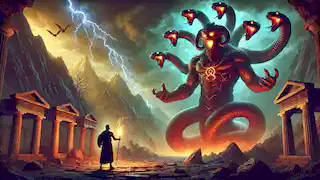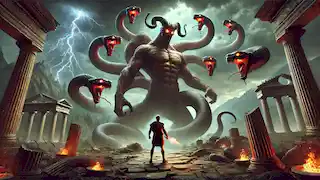The Legend of Typhon
Reading Time: 6 min

About Story: The Legend of Typhon is a Legend from greece set in the Ancient. This Dramatic tale explores themes of Good vs. Evil and is suitable for All Ages. It offers Cultural insights. A fierce battle between gods and monster that will shape the fate of Olympus.
In the heart of ancient Greece, a land of myth and majesty, there was a story feared by gods and men alike: the tale of Typhon, the mightiest of monsters. Known as the "Father of All Monsters," Typhon embodied raw destruction, chaos, and unfathomable power. He was born from the primordial forces of the world, and his life would bring the gods of Olympus to the brink of despair. But in a story that intertwines rage and resilience, betrayal and bravery, the legend of Typhon goes beyond mere destruction—it speaks of the delicate balance between order and chaos in the world. Long ago, when the world was still young, the Earth herself, Gaia, grew restless. She had witnessed the rise of the Olympian gods, led by Zeus, who ruled with an iron grip from their thrones atop Mount Olympus. Gaia, the great mother of all, had watched as her other children, the Titans, were overthrown and imprisoned. Filled with anger and a desire for vengeance against Zeus, she decided to create a being that could restore her children’s honor—a creature so powerful, it would bring Olympus to its knees. Gaia descended into the dark depths of Tartarus, where she called upon the fire and rage of the underworld. Combining the brutal force of the earth with the seething energy of the void, she gave birth to Typhon. Towering, fearsome, and unimaginable in strength, Typhon was a beast like none before. His head scraped the heavens, his eyes glowed like molten lava, and his voice was a storm that shook the heavens and the earth alike. The gods, sensing an unprecedented power rising from the depths, grew uneasy. Whispers of a beast born to challenge the divine throne spread through Olympus. In a panic, they summoned Zeus, their king, hoping he would have the strength to face this unimaginable threat. Zeus, though mighty, felt a chill of foreboding. Yet, as king of the gods, he could not let fear overtake him. With his thunderbolts clutched in hand, he prepared to meet Typhon in battle. Upon sighting the beast for the first time, even the king of Olympus was taken aback. Typhon towered above all creation, his hundred snake-like heads hissing and snarling, each head capable of unleashing a storm, a fire, or a torrent of water. The skies darkened as Zeus descended from Olympus, and the earth trembled as Typhon approached. They met in a valley that would be remembered for eternity as the Valley of Chaos, where mountains would be uprooted and rivers diverted by the force of their battle. The clash was like nothing ever seen before. Thunder and lightning erupted from Zeus, striking Typhon's serpentine heads with an explosive fury, but Typhon responded with equal might, hurling boulders and fire back at the god. The skies and the land seemed to tear asunder in their struggle, and even the Titans in their prison felt the quake of their combat. The battle raged for days, neither yielding an inch to the other. But as Zeus began to tire, Typhon saw his chance to strike the Olympian down. In a moment of vulnerability, Typhon seized Zeus in his mighty coils. With a crushing grip, he tore Zeus's tendons, rendering the king of gods powerless. He threw him down to the earth, burying him beneath rocks and rubble. The Olympian gods, watching from their lofty heights, were horrified. Their king, their protector, had fallen. Many of them fled in terror, retreating to Egypt and disguising themselves as animals to escape Typhon’s wrath. Typhon, triumphant, took Zeus’s thunderbolts, feeling the weight of his victory. The gods were scattered and in hiding, Olympus lay silent, and the world began to spiral into chaos. Typhon roared his defiance to the heavens, declaring himself the new ruler of all. But in the heart of the mountains where Zeus lay, a faint glimmer of hope remained. Hermes, the swift-footed messenger of the gods, and Pan, the god of the wild, dared to approach the fallen king. They devised a plan to retrieve Zeus’s tendons and restore his strength. Disguising themselves and using their cunning, they slipped into Typhon’s lair, stole back the precious tendons, and reattached them to Zeus, reviving him and filling him with renewed vigor. Restored and burning with a newfound fury, Zeus ascended once more to confront Typhon. This time, he did not merely bring thunderbolts; he called upon the power of all the elements. Fire, wind, and water surged through him as he prepared to face the beast one last time. The battle was fierce and unrelenting, but Zeus, empowered by his rekindled strength and his unbreakable will, began to turn the tide. With each strike, he weakened Typhon, pushing the beast back into the dark depths from whence he came. Thunderbolts rained down in a relentless onslaught, and mountains crumbled under their fury. At last, with one final, earth-shaking blow, Zeus cast Typhon down, imprisoning him beneath Mount Etna. Typhon roared and thrashed, but the weight of the mountain held him fast. To this day, it is said that when Mount Etna erupts, it is Typhon raging beneath, his fury undiminished even in eternal imprisonment. {{{_02}}} With Typhon defeated, the Olympian gods returned to their thrones, and peace was restored to the world. But the battle had left its mark. The land bore the scars of their struggle, reshaped by the fury of their combat. Rivers flowed in new directions, valleys lay in ruin, and mountains stood as silent witnesses to the might of the gods and the power of Typhon. The mortals below, though grateful for the return of peace, lived in awe and fear of the gods, understanding that their world could be torn apart by forces beyond their comprehension at any moment. Temples were built in Zeus’s honor, and offerings were made to appease the gods, for the people knew that the peace they enjoyed was fragile, balanced on the edge of divine will and ancient power. The tale of Typhon and Zeus became legend, passed down through generations as a story of power, pride, and resilience. While Typhon remains buried, the story of his challenge endures as a warning and a testament to the balance that must be maintained between order and chaos. His rage is a reminder that no power, not even that of the gods, is beyond challenge, and that even in defeat, the mightiest beings leave an indelible mark on the world. And so, the people of Greece look to Mount Etna, watching for signs, listening for the low rumble of Typhon’s eternal fury, ever wary that one day, he may rise again. {{{_03}}}Born of Fire and Fury
The Divine Challenge

The Fall of Zeus
The Final Confrontation
A World Reshaped
Epilogue: The Legend Lives On

















